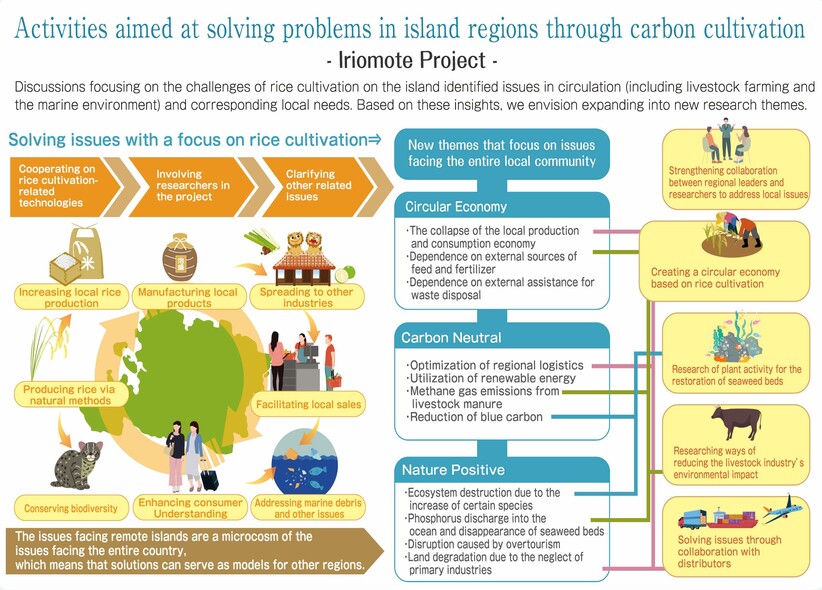Carbon Cultivation Hub Iriomote Island Project (TUAT COI-NEXT) - Proposing a sustainable regional circulation model through collaboration between Taketomi Town, local businesses, and universities -
Carbon Cultivation Hub Iriomote Island Project (TUAT COI-NEXT)
- Proposing a sustainable regional circulation model through collaboration between Taketomi Town, local businesses, and universities -
As one of the demonstration projects, this hub has been promoting the Iriomote Island Project in collaboration between industry, academia, public, and private sectors in Iriomote Island, a World Natural Heritage Site, by Taketomi Town, local businesses (rice producers, sake breweries, hotels, and distribution businesses), and universities (Tokyo University of Agriculture and Technology, Waseda University, and University of the Ryukyus). This time, it has been decided to release Awamori (a type of traditional spirits) made with 100% rice from Iriomote Island, which has been manufactured as part of the project. By purchasing this product, it will directly support farmers on Iriomote Island and lead to the preservation of the paddy environment that nurtures rare ecosystems.
background
Iriomote Island, which was registered as a World Natural Heritage Site in 2021, faces increasing demands for environmental conservation, while rice farmers face economic difficulties such as high production and distribution costs unique to remote islands and reduced yields due to environmentally friendly farming methods. If this continues, there were concerns that the abandonment of cultivation would progress, and the paddy field environment that supports the ecosystem of rare creatures such as the Iriomote wildcat would be lost.
Overview of the Demonstration Project
Toward solving problems in island areas through carbon Cultivation -Iriomote Island Project-
In the demonstration project of this hub, we have aimed to contribute to the revitalization and sustainable development of the local economy, and have aimed to collaborate with production, manufacturing, distribution, and consumers based on "building a stacked environmental design" that identifies and solves local issues, and "communicating to consumers and creating an understanding of value."
In order to solve these issues, the Iriomote Island Project is a "sixth industrialization model" that integrates rice production (primary) to processing into awamori (secondary), distribution, and sales (tertiary).
In order to solve the issues of "environmental conservation" and "regional development" faced by Iriomote Island, a World Natural Heritage Site, the Awamori released this time, the Carbon cultivation technology (*) of Tokyo University of Agriculture and Technology, a COI-NEXT participating organization, and the research on resource recycling systems at Waseda University and the University of the Ryukyus, as well as the manufacturing technology of TAKAMINE SYUZOSHO, an Awamori brewery which bears the tradition of the region, AEON RYUKYU's sales network, and support from Taketomi Town, etc. It was born from the combination of industry, academia, public and private sectors.
Future developments
In order to achieve sustainable development through Carbon Cultivaion, the collaboration among production, manufacturing, distribution, and consumers is very important. We believe that the fact that this product will be in the hands of consumers will lead to support for farmers, and as a result, local production for local consumption will be realized, and it will also contribute to the environmental protection of Iriomote Island.
This hub will continue to solve various issues on Iriomote Island and other island areas through carbon farming, and aim to create a new regional circulation system.

[Product overview]
Product name: Ryukyu Awamori "Irimuti no Saki"
Release date: Saturday, November 1, 2025 (planned)
Ingredients: Rice koji (rice grown in Iriomote Island), water from Iriomote Island used for brewing
Sales locations: Restaurants and accommodations on Iriomote Island, TAKAMINE SYUZOSHO
Manufacturer: TAKAMINE SYUZOSHO
This research was supported by the JST Co-Creation Space Formation Support Program JPMJPF2104.
*Carbon cultivation technology
This refers to the technology for actively producing, valorizing, and recycling biomass. At our center, we call the process of using biotechnology to fix carbon (CO₂) and then producing, valorizing, and recycling materials and energy "Carbon Cultivation."
◆Inquiries regarding this matter◆
Tokyo University of Agriculture and Technology COI-NEXT Secretariat
TEL:042-367-5703
Email:tuat_coi-next-groups (put @ here)go.tuat.ac.jp
Related links (opens in new window)
